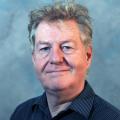Sixty one years ago, Ayrshire man John Townsend looked on in astonishment as 21 nuclear devices exploded in the skies over the Pacific.
Now the former RAF Flight Lieutenant has finally been given a medal for his work in communications intelligence on Christmas Island in 1962.
Looking back at his incredible experience all those years ago, the Ardrossan resident said: "We looked across the sea and saw the flash. I turned away, then turned back and saw the mushroom cloud grow and grow and grow.

"At first we felt the surge of heat and then the light hit us - but it seemed like a couple of minutes before we heard the bang. It was beyond belief...
"It was frightening. Totally, totally terrifying. I came away from Christmas island with the impression that any blighter who had dropped one of these in a war should be taken away and shot."
Within a year of those tests, above ground nuclear detonations were banned.
John, now 87, received his medal last week without pomp or circumstance - it simply dropped through his letter box.
He said a number of surviving nuclear test veterans has been disappointed at the lack of an official presentation and a lack of inscription on the medal itself.

Veterans and their families had campaigned for decades for medals to be awarded to the nuclear test witnesses.
Prime Minister Rishi Sunak finally agreed to their demands last November.
John, who was born in Reading and moved to Ardrossan 17 years ago, said: "Some veterans and their families thought Rishi Sunak had decided to give them the medal rather than sue for compensation."
The Christmas Island nuclear tests - known as Operation Dominic - were at the height of the Cold War between the West and the USSR. And the American military were awaiting news of a nuclear test treaty being agreed.
Some of their nuclear devices had not yet been tested. And the US approached Britain for permission to carry out the explosions in the area around the Commonwealth Territory of Christmas Island.
Tests on British nuclear bombs had been carried out in the area a few years earlier.

John was a communications expert and was experienced in using codes and cyphers.
He revealed: "I had to acclimatise myself on Christmas Island for seven or eight weeks. I was in a camp on the coast and eventually we got the message that the Americans were about to start the tests.
"For the first test, we were told to sit down and wear black glasses and not to look at the flash.
"For the next ones, we just wandered to the shore and looked out across the water waiting for the bang. When they said 'they're dropping them now' we turned away because we could have been blinded.
"There were sometimes delays and some people went back to bed. A few of them were blown out of bed when it happened as the whole hut rattled.
"Following most of the tests, the Americans decided they wanted to run a communications test - to see how a nuclear blast would affect their comms.
"They fired three rockets from an island just north of the Equator, while we were two degrees south.
"One was destroyed when it went off course, the other two were fired into the upper atmosphere, towards the Van Allen Belt.
"Firing a nuke in space. We looked into the sky and saw a bloody great colourful blast. In New Zealand they called them the rainbow bombs. They were not just red, but yellow, blue and many other colours. It was a sight to see.
"We ran tests during the exercise as we wanted to find out how our communications would cope if there was a nuclear explosion.
"We ran four different communications wavelengths and they got quite different results and allowed us to decide what wavelengths to use in a time of emergency."
He added: "The US did a test by flying a fighter plane through the radiation cloud. When it landed the plane was so hot and the pilot had to be removed to hospital."
John is glad his service has finally been recognised, adding: "They told us earlier that they hoped to get all the medals to us by Remembrance Day.
"I have been ill recently and I joked with the doctor that I wanted to survive to Remembrance Day to get my medal. I'm glad that's the case."








Comments: Our rules
We want our comments to be a lively and valuable part of our community - a place where readers can debate and engage with the most important local issues. The ability to comment on our stories is a privilege, not a right, however, and that privilege may be withdrawn if it is abused or misused.
Please report any comments that break our rules.
Read the rules here